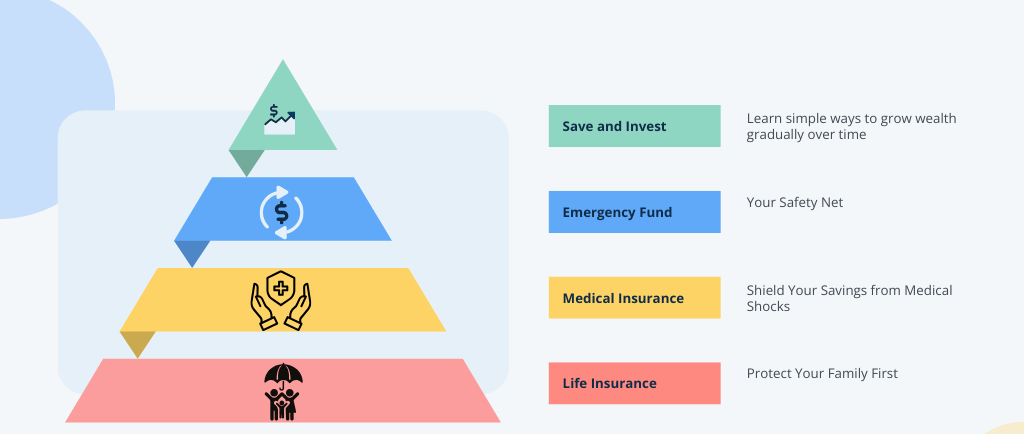Financial Priorities You Must Set Before You Start Investing
Most people jump into investing without setting their financial foundation right. But smart financial planning always begins with protection before growth. Just like a strong building needs a solid base, your wealth journey should follow a clear order of priorities. Let’s look at the four essential steps to take before you start investing
8/15/20252 min read


1. Life Insurance – Protect Your Family First
Your first priority must be life insurance, especially if you have dependents like a spouse, children, or aging parents. If something were to happen to you, life insurance ensures your family doesn’t suffer financially.
How much should you have?
A simple rule: get a term life insurance cover of at least 10–15 times your annual income.
For example, if you earn ₹10 lakhs per year, you should ideally have a cover of ₹1–1.5 crore.
Avoid complicated policies like endowment or ULIPs. Go for a pure term plan – it’s cheaper and gives higher coverage.
2. Medical Insurance – Shield Your Savings from Medical Shocks
One medical emergency can wipe out years of savings. That’s why health insurance is your next must-have.
How much should you have?
For individuals: Minimum ₹5–10 lakhs.
For a family of four: opt for a family floater policy of ₹10–20 lakhs, depending on the city you live in and your family’s health history.
Even if your employer gives health insurance, consider a personal policy too. Job changes or layoffs shouldn’t leave you unprotected.
Bonus tip here is to get a top-up insurance plan up to INR 1 Crore by paying very little and getting high-value cover. Not a single agent will give this advice since it's underrated, and agents get very low commissions on it.
3. Emergency Fund – Your Safety Net
Unexpected events like job loss, accidents, or urgent home repairs can derail your plans. An emergency fund helps you avoid dipping into your investments or taking loans.
How much should you have?
Keep at least 3 to 6 months of monthly expenses in a liquid fund or savings account.
For example, if your monthly expense is ₹50,000, aim for ₹1.5 to ₹3 lakhs as emergency savings.
This fund must be easily accessible and should not be invested in high-risk instruments.
4. Save and Invest – Now You're Ready
Only after securing your risks should you start investing. Keep it simple and avoid chasing hot tips or trends.
Start with:
Index Funds – These are low-cost mutual funds that track the market (like Nifty 50). Ideal for beginners.
Multicap Funds – These diversify your money across large, mid, and small companies. Slightly higher risk, but better long-term potential.
Begin with a SIP (Systematic Investment Plan) of an amount you're comfortable with, and increase it as your income grows.
Final Thought
Wealth creation is not just about returns – it’s about being financially secure and prepared.
By following this priority list — Life Insurance → Health Insurance → Emergency Fund → Investments — you’re building a rock-solid financial foundation.
Start right. Invest wisely. Stay protected.
